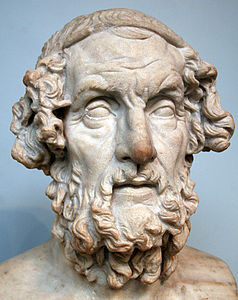Homer
She Homer (Clowan:Lang-grc, Hómēros) yn ughtar shenn-skeealagh as ughtarys yn Iliad as yn Odyssey (daa ghaan ard-skeealagh ta coontit myr obbraghyn bunneydagh lettyraght y Çhenn-Ghreag) currit da. T'eh coontit myr fer jeh ny h-ughtaryn smoo cummaghtaagh v'ayn rieau er dy henney.[1] 'Syn Aittys Jeeoilagh liorish Dante Alighieri, ta Virgil cur sheese er myr "feelee ard-reeoil", ree dagh feelee;[2] ayns roie-ockle jeh'n çhyndaa echey er yn Iliad, as ta Alexander Pope goaill rish yn eie dy nee Homer "y fer share mastey ny feeleeyn".[3]
| Homer | |
|---|---|
 Jalloo marmyr jeh Homer. Coip Raueagh jeh soylley bunneydagh Greagagh 2h eash RC | |
| Ennym ruggyree | Ὅμηρος |
| Ruggit |
c. 9 century RC unknown value |
| Hooar baase |
c. 8 century RC Ios |
| Seyraanaght |
Ionian League (en) |
| Çhengey | Shenn-Ghreagish |
| Keird | feelee · ughtar · screeudeyr |
| Bleeantyn obbree | 8oo eash yeianagh RC |
| Shaanrey | daan ard-skeealagh |
| Moir | Kretheis |
| Kianglaghyn fysseree as sheshoil | |
| IMDb | nm0392955 |
| Discogs ID | 706034 |
Imraaghyn
reagh- ↑ "Learn about Homer's The Iliad and The Odyssey". Encyclopaedia Britannica. Feddynit magh er 31 Luanistyn 2021.
- ↑ Divine Comedy, Inferno, Canto IV, 86-88 (çhyndaa Longfellow):
"Him with that falchion in his hand behold,
Who comes before the three, even as their lord.
That one is Homer, Poet sovereign;" - ↑ Roie-ockle Alexander Pope roish e hyndaa jeh'n Iliad:
"Homer is universally allowed to have had the greatest invention of any writer whatever. The praise of judgment Virgil has justly contested with him, and others may have their pretensions as to particular excellencies; but his invention remains yet unrivalled. Nor is it a wonder if he has ever been acknowledged the greatest of poets, who most excelled in that which is the very foundation of poetry."
Kianglaghyn magh
reaghTa tooilley mean ayns Wikimedia Commons bentyn rish: Homer.
- Homer; Murray, A.T. (1925). The Iliad with an English Translation (ayns Ancient Greek as English). Ym-l. I, Lioaryn I–XII. Lunnin; York Noa: William Heinemann Ltd.; G.P. Putnam's Sons; Internet Archive.
- The Chicago Homer
- Heath, Malcolm (4 May 2001). "CLAS3152 Further Greek Literature II: Aristotle's Poetics: Notes on Homer's Iliad and Odyssey". Department of Classics, University of Leeds; Internet Archive. Er ny hashtey veih yn lhieggan bunneydagh er 8 September 2008. Feddynit magh er 7 November 2014.
- Bassino, Paola (2014). "Homer: A Guide to Selected Sources". Living Poets: a new approach to ancient history. Durham University. Feddynit magh er 18 November 2014.